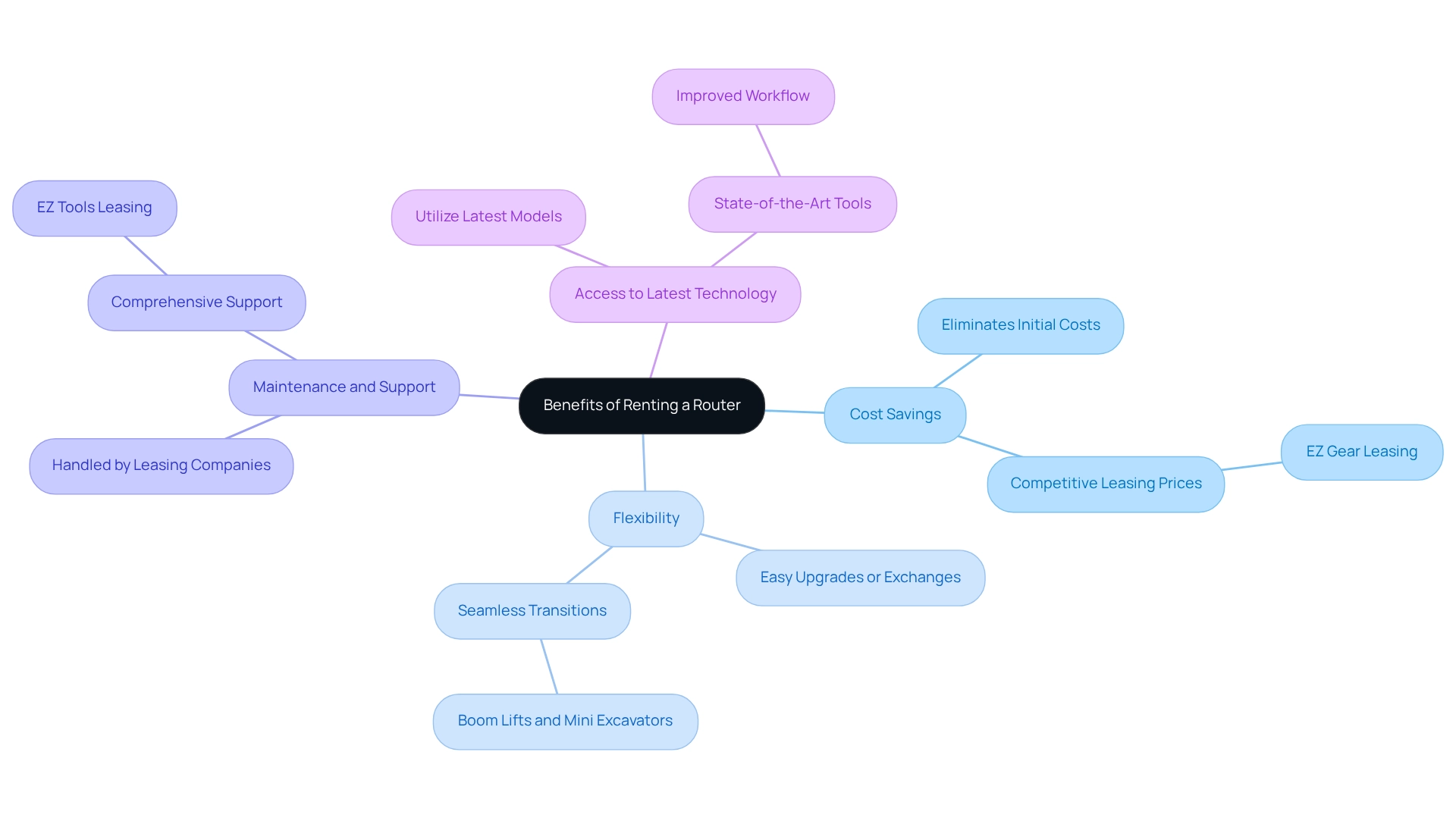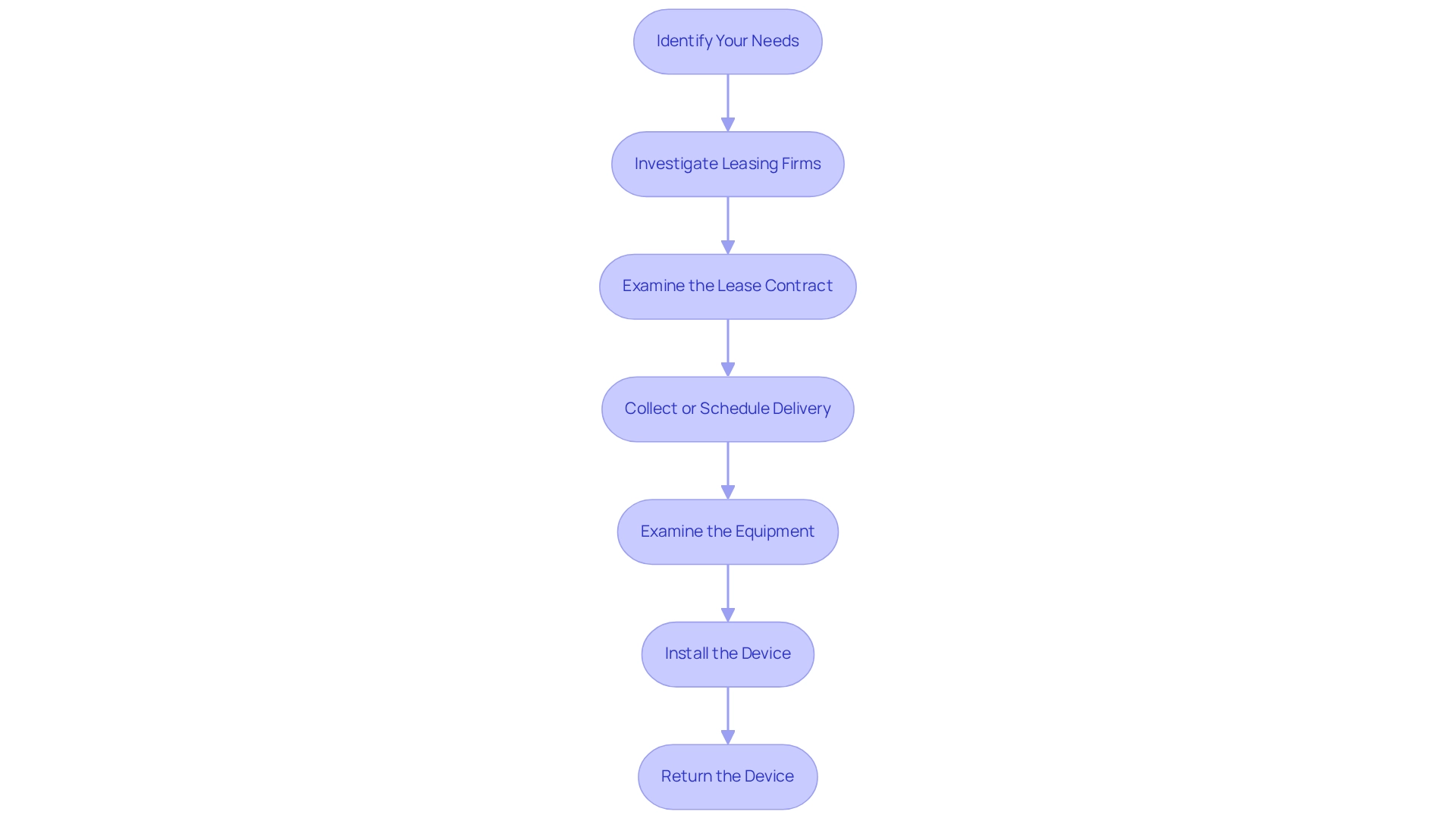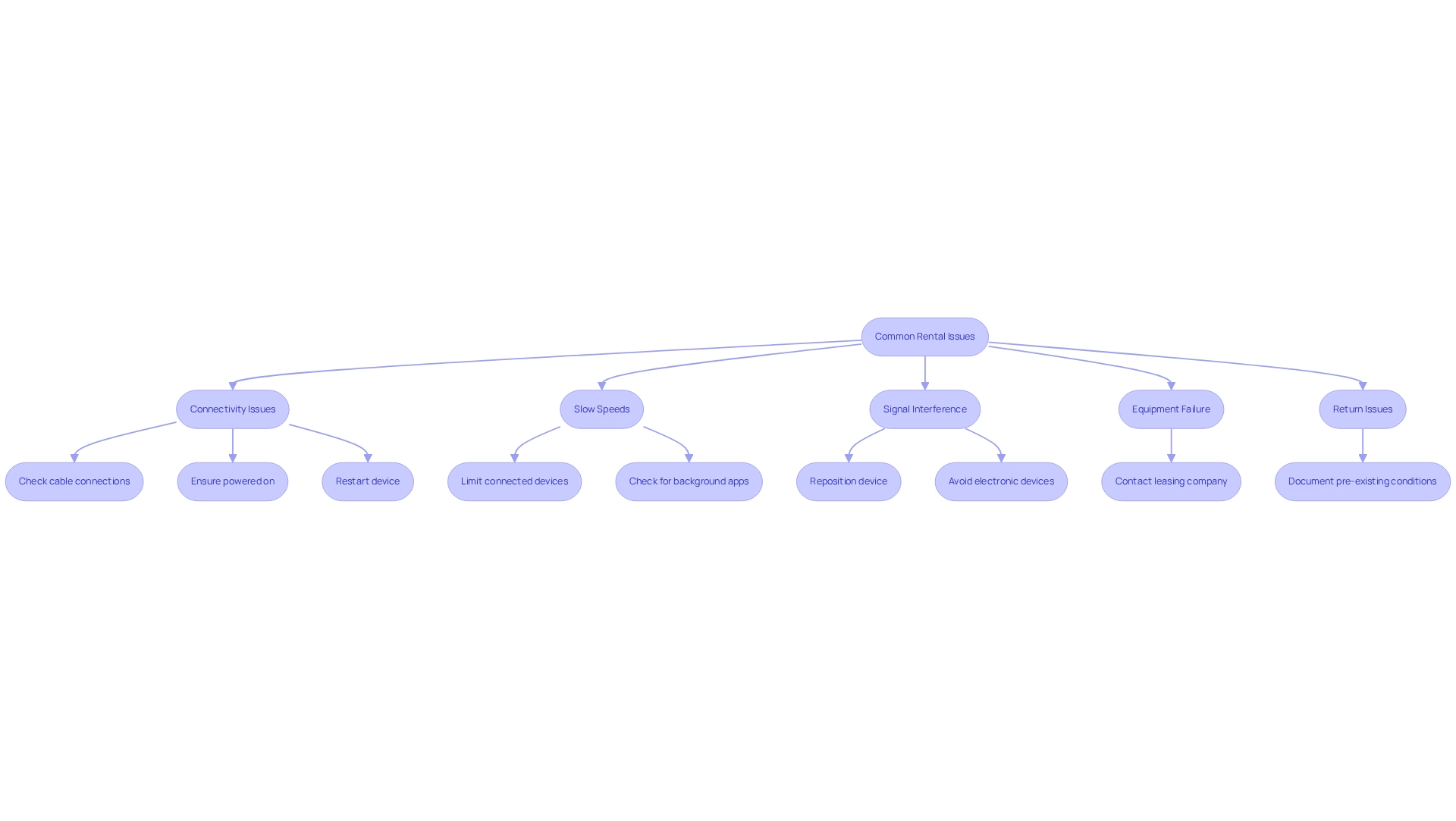Overview
Renting a router for your construction project delivers substantial cost savings, flexibility in equipment upgrades, and access to cutting-edge technology, all while minimizing maintenance responsibilities. This approach not only enhances project efficiency but also ensures reliable connectivity. The rental process is straightforward, encompassing key steps such as:
- Identifying specific needs
- Researching reputable firms
- Troubleshooting common issues
By following these steps, you can effectively manage your project with confidence in your connectivity solutions.
Key Highlights:
- Renting a router offers cost savings by avoiding large upfront purchases, particularly for temporary projects.
- Leasing allows for flexibility in upgrading or exchanging equipment as project needs change.
- Maintenance and repairs are typically handled by leasing companies, reducing downtime.
- Renting provides access to the latest technology, enhancing project efficiency.
- The rental process includes identifying needs, researching firms, reviewing contracts, and inspecting equipment.
- Common rental issues include connectivity problems, slow speeds, signal interference, equipment failure, and return disputes, with troubleshooting steps provided.
Introduction
In the construction industry, efficiency and cost-effectiveness are not just important; they are essential. As projects progress, the demand for reliable equipment becomes increasingly critical. Renting a router stands out as a strategic solution that alleviates the financial burden associated with purchasing. This approach not only provides flexibility but also ensures access to the latest technology and maintenance support.
By examining the benefits of router rentals, understanding the step-by-step process, and addressing potential issues, construction professionals can guarantee that their projects run smoothly and remain within budget.
Explore how renting can revolutionize your construction experience and empower your team to meet their objectives.
Understand the Benefits of Renting a Router
Renting a device for your construction project presents numerous advantages.
- Cost Savings: Renting eliminates the substantial initial costs associated with purchasing equipment, making it a financially savvy option, especially for temporary projects. EZ Gear Leasing in Irving, TX, offers competitive leasing prices for a variety of tools, allowing you to easily rent a router, forklifts, and trailers while ensuring you stay within budget.
- Flexibility: Lease agreements typically allow for easy upgrades or exchanges as your project needs evolve, ensuring you always have the right equipment. With EZ Tool Leasing, transitioning to different tools or machinery, such as boom lifts or mini excavators, is seamless as your project progresses.
- Maintenance and Support: Leasing companies generally handle maintenance and repairs, reducing downtime and guaranteeing that you have reliable equipment throughout your project. EZ Tools Leasing provides comprehensive support, enabling you to focus on your construction tasks without worrying about machinery issues.
- Access to Latest Technology: Renting gives you the opportunity to utilize the latest models without the commitment of ownership, which can significantly enhance your project's efficiency and effectiveness. By choosing EZ Equipment Rental, you can rent a router along with state-of-the-art tools and machinery that can greatly improve your workflow.
By recognizing these advantages, you can better assess whether leasing equipment aligns with your project needs and budget, especially when considering the extensive range of equipment available through EZ Equipment Rental in the DFW Metroplex. Visit us at our Irving location to explore our offerings.

Follow the Step-by-Step Rental Process
To lease a device for your construction project, follow these essential steps:
- Identify Your Needs: Begin by determining the specifications necessary for your project, such as the type of access point (e.g., wireless or wired), required speed, and any additional features.
- Investigate Leasing Firms: Search for reputable machinery leasing firms in your area, like EZ Machinery Leasing, where you can rent a router along with a wide selection of tools, including boom lifts, excavators, and forklifts. Compare their offerings, pricing, and leasing terms to find the best fit for your requirements, and contact the Equipment Provider to check if you can rent a router from EZ Equipment Hire. Inquire about lease rates, deposit requirements, and any additional charges. Their customer service team is readily accessible and prepared to assist you with your inquiries.
- Examine the Lease Contract: Carefully review the lease contract, focusing on the duration, terms of use, and return policies. Ensure you fully understand your responsibilities regarding the equipment.
- Collect or Schedule Delivery: Decide whether you will collect the device or if EZ Rental offers delivery options. If you choose to pick it up, ensure you have the necessary transportation arranged.
- Examine the Equipment: Before leaving the leasing site, inspect the device for any damage or missing components. Report any issues to the leasing staff to avoid potential charges later.
- Install the Device: Follow the manufacturer's instructions to set up the equipment at your job site, ensuring it meets your connectivity needs.
- Return the Device: At the end of your lease period, return the device according to the agreement. Make sure it is in the same condition as when you received it to prevent any extra fees.
For all your gear rental requirements, including the opportunity to rent a router, reach out to EZ Equipment Rental today!

Troubleshoot Common Rental Issues
When you rent a router, you may encounter common issues that can impede your experience. Here’s a guide to effectively troubleshoot them:
-
Connectivity Issues: If the device fails to connect to the internet, first check all cable connections and ensure that it is powered on. Restarting the device can often resolve the issue; simply unplug it for 10 seconds before plugging it back in.
-
Slow Speeds: Experiencing slow internet speeds? Ensure that other devices are not consuming excessive bandwidth. Limit the number of connected devices and check for background applications that may be utilizing data.
-
Signal Interference: A weak signal can be frustrating. To improve connectivity, reposition the device to a more central location, away from walls and barriers. Additionally, avoid placing it near other electronic devices that could cause interference.
-
Equipment Failure: If the device is malfunctioning, it’s crucial to contact the leasing company promptly. Most companies provide a replacement or repair service as part of the lease agreement, ensuring minimal disruption to your service.
-
Return Issues: When returning the router, disputes over damage can arise. It is essential to refer back to your initial inspection notes. Document any pre-existing conditions to support your case effectively; by being proactive and prepared, you can manage these common rental issues effectively, especially if you need to rent a router to keep your project on track.

Conclusion
Renting a router for construction projects is not just a choice; it is a strategic move that significantly enhances efficiency while managing costs effectively. The benefits of this approach—such as substantial cost savings, flexibility in equipment use, and access to cutting-edge technology—position it as an appealing option for industry professionals. Additionally, the maintenance and support offered by rental companies like EZ Equipment Rental ensure that projects can progress smoothly, avoiding the interruptions that equipment failures often cause.
The straightforward step-by-step rental process empowers construction teams to select the right equipment tailored to their specific needs. By clearly identifying project requirements, researching rental options, and meticulously reviewing agreements, professionals can make informed decisions that align with both their budget and operational objectives.
Proactively addressing potential issues—whether they relate to connectivity, speed, or equipment malfunctions—can further streamline the rental experience. With the right preparation and support, construction teams can navigate challenges effectively, maintaining momentum throughout their projects.
Ultimately, choosing to rent a router alleviates financial burdens while equipping teams with the essential tools needed to achieve their objectives efficiently. Embracing this approach can transform the construction experience, empowering professionals to concentrate on what truly matters: delivering quality results on time and within budget.
Frequently Asked Questions
What are the main advantages of renting equipment for construction projects?
The main advantages include cost savings, flexibility, maintenance and support, and access to the latest technology.
How does renting equipment help with cost savings?
Renting eliminates substantial initial costs associated with purchasing equipment, making it a financially savvy option, especially for temporary projects.
What flexibility does renting provide during a construction project?
Lease agreements typically allow for easy upgrades or exchanges of equipment as project needs evolve, ensuring you have the right tools throughout the project.
What kind of maintenance and support can be expected when renting equipment?
Leasing companies generally handle maintenance and repairs, which reduces downtime and ensures reliable equipment for your project.
How does renting equipment give access to the latest technology?
Renting allows you to utilize the latest models without the commitment of ownership, enhancing your project's efficiency and effectiveness.
Where can I find equipment rental services in the DFW Metroplex?
You can explore offerings at EZ Equipment Rental in Irving, TX, which provides a wide range of tools and machinery for construction projects.




